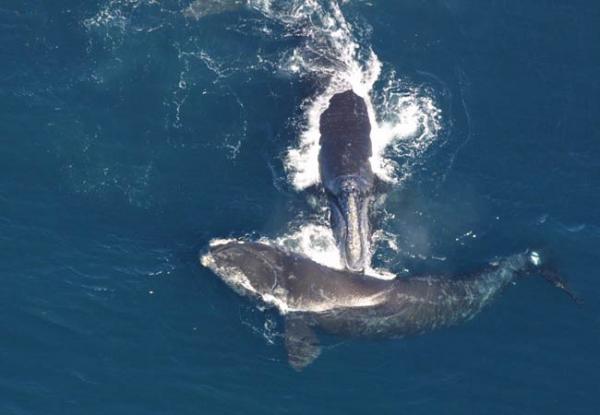
Hundreds of Endangered Whales Swarming New England Coast

A record number of critically endangered right whales are crowding the chilly waters off Cape Cod, Mass.
Researchers counted more than 100, and possibly as many as 200, animals during aerial surveys on Tuesday, the Boston Globe reported, a number that could represent nearly half the entire known right whale population that remains on Earth. Right whales, one of the rarest kinds of baleen whales, are teetering on the brink of extinction. Only about 450 to 500 North Atlantic right whales are thought to remain on the planet.
Charles "Stormy" Mayo, senior scientist at the Center for Coastal Studies in Provincetown told the Globe the whales are as close as a few yards offshore to about a quarter-mile out, and said he expects the marine crowd to remain in the area for at least another week.
The right whales are gathered for a feeding frenzy on zooplankton , tiny, rice-sized crustaceans the baleen whales strain into their massive mouths.
Mayo said it's likely the record number of whales showed up this year because the waters are particularly rich with plankton this year, in much the same way that, on land, some years are better for crops than others.
"We don't understand that particularly well, but it's clearly a combination of oceanographic processes and a lot of marine biology," Mayo said. "There are currents that bring the plankton into the area and local currents that cause them to concentrate, and it's probably an overlapping of a lot of physical processes."
Despite their tiny-sized diet, right whales are enormous. The largest can reach up to 60 feet (18 meters) and the whales weigh from 132,000 to 220,500 pounds (60,000 to 100,000 kilograms).
Sign up for the Live Science daily newsletter now
Get the world’s most fascinating discoveries delivered straight to your inbox.
The whales have distinctive, rough, raised patches on their heads, which are often infested with whale lice, turning the large, crusty growths a whitish color.
So many whales are crowding Cape Cod that the Massachusetts Division of Marine Fisheries has issued a warning for boaters to steer clear of the animals. It's against federal law to get within 500 yards of the enormous mammals -- whales have historically been fatally injured by boats.
"The loss of one breeding female could be detrimental to the recovery of the species," Tanya Grady, a spokeswoman for the Center of Coastal Studies told the Boston Globe.
Mayo said those who want to see the whales can take a walk along the beach, and said the massive gathering is exciting, even for scientists accustomed to cetacean sightings.
"We're used to seeing right whales," Mayo said. "But even though we do a lot of research on them, it's a thrilling time. It is a very special occasion being around such an extraordinarily rare animal."










